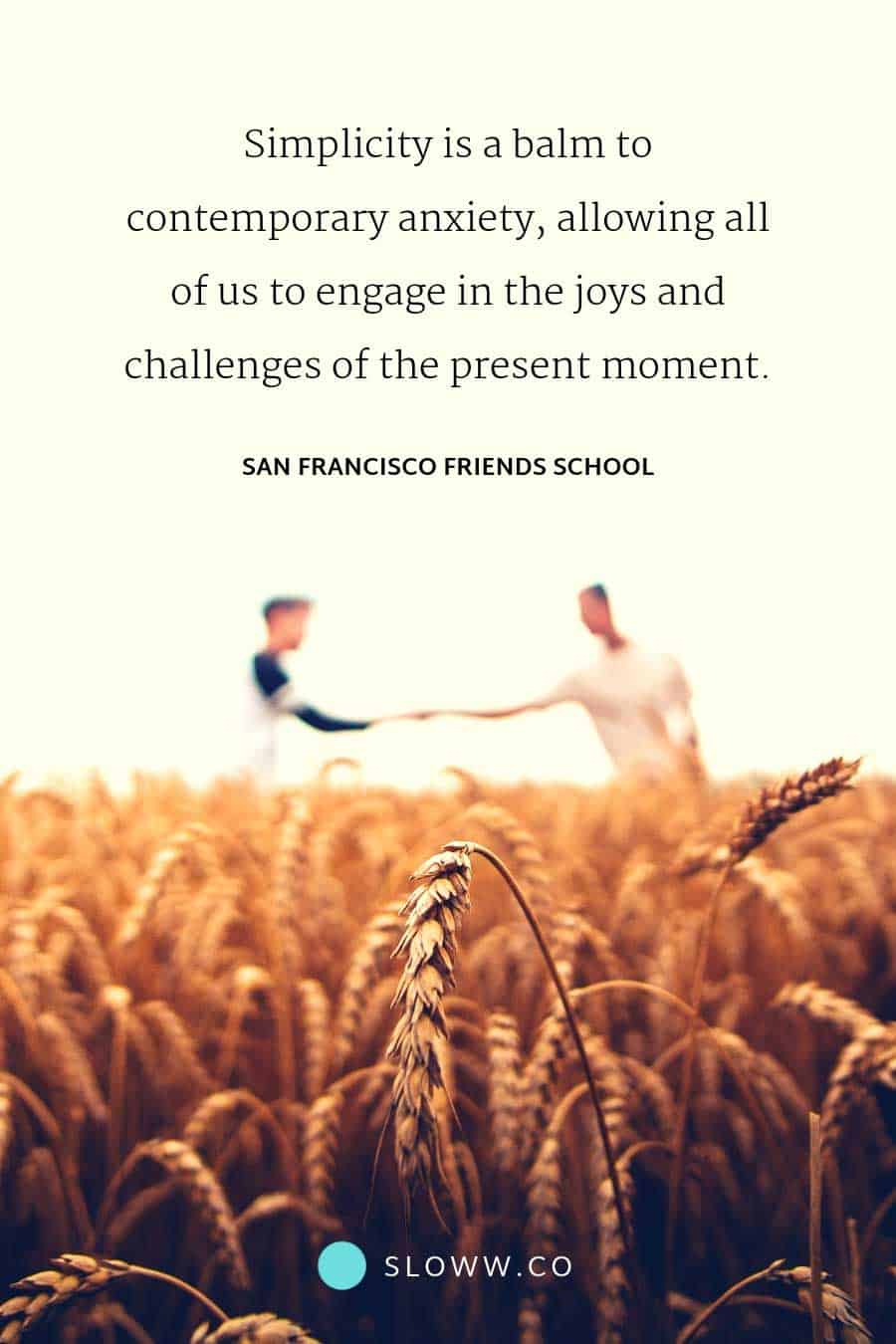
Note: This post isn’t intended to address any religious views.
I believe we can all learn something new about our common humanity by expanding our minds and opening them to other cultures and spiritualities.
This is nothing new. Over a century ago, non-Quaker Julia Ward Howe wrote:
Here I am, in Quaker surroundings, whose restful simplicity is most congenial to me. I feel here the earnest desire for genuine growth and culture which founds a slow but sure success. I am confirmed in my division of human energies. Ambitious people climb, but faithful people build. — Julia Ward Howe
Woah. She covered a lot of ground there: slow living, simple living, energy, ambition, spirituality.
Some modern Quakers—also known as Friends—have six values or testimonies that they call “SPICES.”
S-P-I-C-E-S stands for:
- Simplicity
- Peace
- Integrity
- Community
- Equality
- Stewardship
While there are plenty of things we can learn from all six values, this post dives into just one: the testimony of simplicity.
What is the Quaker Testimony of Simplicity?
If it’s possible to sum up the history of the testimony of simplicity in a single quote, this may be the one:
The first generation of Friends did not have a testimony for simplicity. They came upon a faith which cut to the root of the way they saw life, radically reorienting it. They saw that all they did must flow directly from what they experienced as true, and that if it did not, both the knowing and the doing became false. In order to keep the knowledge clear and the doing true, they stripped away anything which seemed to get in the way. They called those things superfluities, and it is this radical process of stripping for clear-seeing which we now term simplicity. — Fran Irene Taber
Incredible. Let’s continue by breaking down the testimony of simplicity. I’ve added emphasis in bold throughout the best descriptions below.
First, what does testimony mean?
- “The word testimony describes the way that Friends testify or bear witness to their beliefs in their everyday life. A testimony is therefore not a belief, but is committed action arising out of Friends’ religious experience.”¹
The testimony of simplicity in the words of the Quakers/Friends:
- “A person ought to live a simple life in order to focus on what is most important and ignore or play down what is least important.”¹
- “Simplicity is a witness to the world that the inward state is more important than the outward.”²
- “We need to think of simplicity not as an impossible demand, but as an invitation to a more centered, intentional, and fulfilling Spirit-led life. Simplicity flows from well-ordered living. It is less a matter of doing without, than a spiritual quality that simplifies our lives by putting first things first.”³
- “Simplicity like all the testimonies is essentially a spiritual discipline. We simplify our lives in order to come closer to the truth.”4
- “For the Quakers, living simply is about seeking to live more meaningfully. Quakers have long referred to the unnecessary accumulation of material items as ‘cumber,’ and they believed it obscured their vision of both God’s will and reality. It can be spiritually cleansing to disinvest oneself of unnecessary possessions, to recycle unused items, or give away things you no longer truly need. But ‘cumber’ can mean more than material possessions – it can represent unnecessary mental or spiritual cumber, or living beyond our emotional means.“5
And, perhaps my two favorites:
“Simplicity is a balm to contemporary anxiety, allowing all of us to engage in the joys and challenges of the present moment.”6
“Keep life simple so we are free to live in harmony and alignment with soul’s purpose.”7

The 3 Aspects of the Testimony of Simplicity
The testimony of simplicity revolves around three key elements: dress, speech, and material possessions.
1. Simplicity of Dress
On the surface, you may think plain dress is pretty straightforward (right this second, maybe you’re mentally picturing what you think Quaker dress may look like). However, I’ve learned “simplicity of dress” is subjective.
Modern Quakers/Friends simply dress simply. It doesn’t sound like this is too different from what you may see with some of the minimalist leaders today: consistency, timelessness, maybe similar, coordinating colors. Why would anyone willingly (and gladly) choose this type of dress?
First of all, this approach to fashion and style is timeless. You don’t have to spend time and money on the latest trends, effectively giving back time and money—and energy and mental bandwidth—to spend on the most important things in your life (which typically aren’t things at all). There’s a personal aspect here where you need to overcome your ego and identity since this is voluntary simplicity.
Next, plain dress is intended to eliminate an aspect of social inequality. If everyone dressed in a simple way, it would put people on more of an even (visual/physical) playing field.
Lastly, there’s now an ecological aspect when you think of the wastefulness of trend-based clothing and fast fashion. Every day, we have more and more options for sustainable, ethical, and slow fashion.
Want to really experiment with timeless style? Try a Buy Nothing Year for clothing. I think I’m currently at 16 months without buying a single article of clothing. You start to lose track after awhile and wonder how the old you ever even made time for shopping. I wouldn’t have been able to do this if all my clothing was the latest trend a year and a half ago but now out of style.
2. Simplicity of Speech
This is an interesting one. I’ve also seen this one paired with “simplicity of behavior.”
Here’s how the Quakers/Friends describe it:
- “Simplicity does not mean being simplistic. We value nuance and choose words carefully when we speak. We may speak passionately, but we avoid distortion and exaggeration.”8
- “Honesty, avoiding class distinction (titles)…and the speaking of truth.”¹
I love this. We should all opt for authenticity and remember this quote as well:
- “Do not speak — unless it improves on silence.” — Buddhist proverb
3. Simplicity of Material Possessions
Again, in the words of the Quakers/Friends:
- “Believe that one should use one’s resources, including money and time, deliberately in ways that are most likely to make life truly better for oneself and others.”¹
- “Believe that a person’s spiritual life and character are more important than the quantity of goods he possesses or his monetary worth.”¹
I’ll leave you with this fantastic insight:
There you have it! How can you apply a testimony of simplicity in your own life? Are there ways you can simplify your dress, speech/behavior, or overall quantity (and relationship with) your material possessions? Don’t forget to add the s-p-i-c-e-s of life!
Sources:
- https://en.wikipedia.org/wiki/Testimony_of_simplicity
- https://bigislandquaker.wordpress.com/simplicity-and-quaker-plainness/
- https://www.fgcquaker.org/cloud/resources/testimony-simplicity-0
- https://thefriend.org/article/testimony-to-simplicity
- https://www.renofriends.org/personal-simplicity-a-complicated-idea/
- https://www.sffriendsschool.org/quaker-values/quaker-testimonies
- https://www.friendsjournal.org/s-p-i-c-e-s-quaker-testimonies/
- https://www.afsc.org/testimonies/simplicity




